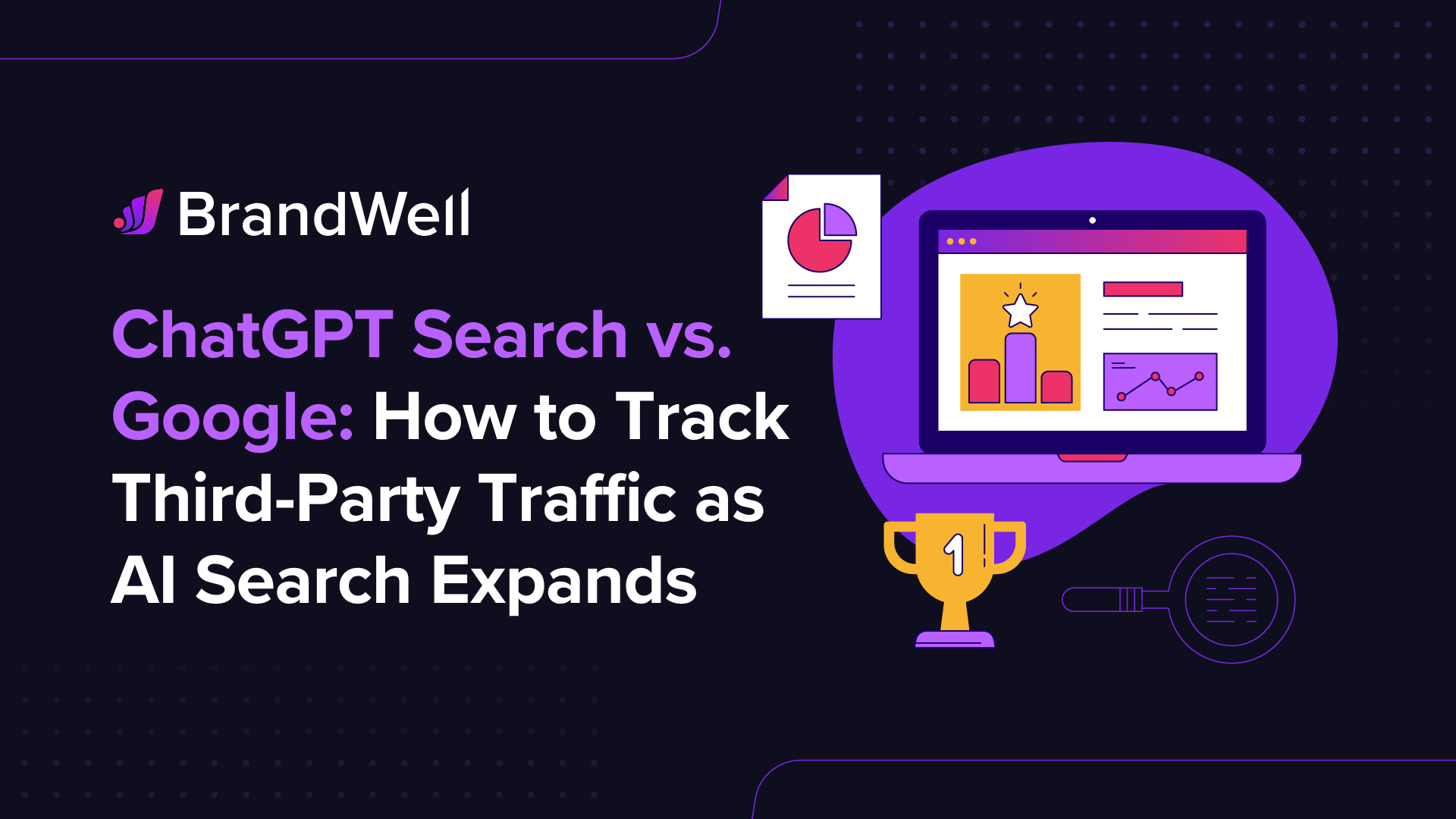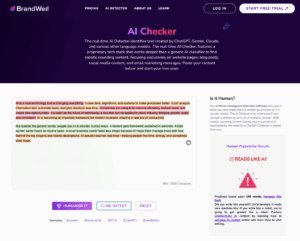OpenAI launched ChatGPT Search on October 31, and the buzz around it has been everywhere.
Naturally, this has raised some questions: Is ChatGPT Search better than Google? Can it actually replace Google?
While ChatGPT has started pretty decent, replacing Google would take a major shift in user habits — one that won’t happen overnight. But the impact AI is already having on the search landscape is undeniable.
For SEOs and digital marketers, it’s worth tracking these trends to see how AI-driven search engines could shape our work and, ultimately, our revenue.
In this article, we’ll break down how ChatGPT Search works, how it’s different from Google Search, and how you can start tracking traffic from these new search engines to your sites to adapt effectively to these changes.
Table of Contents
What is ChatGPT Search?
ChatGPT Search is OpenAI’s latest upgrade to ChatGPT. This feature lets users look up real-time information like current news, stock prices, sports scores, and even local maps — right within the chat. It’s a major improvement over past versions, which only had access to static, pre-existing data.
To access ChatGPT Search, simply type a forward slash (/) and click “Search” or simple choose the “Search” button to enter search mode.
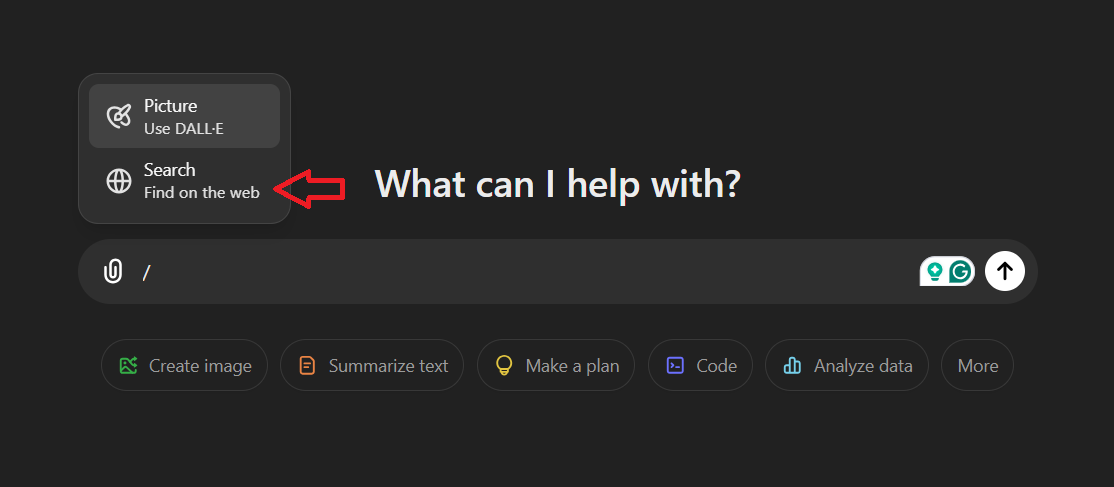
Where Does ChatGPT Search Get Its Data?
ChatGPT Search isn’t a standalone search engine. Instead, it relies on Bing for web search results.
As OpenAI’s engineering VP, Srinivas Narayanan, confirmed in a Reddit thread:
“We use a set of services, and Bing is an important one.”
So as of the moment, ChatGPT doesn’t offer the same extensive, constantly updating index that Google does.
Why does this matter? Two things:
- If your pages aren’t indexed in Bing, they won’t show up in ChatGPT Search results.
- ChatGPT cites pages that might not rank in Bing’s top 100 results, so it’s less about Bing rankings and more about being indexed in the first place.
Let’s take a closer look at ChatGPT Search.
Key Features of ChatGPT Search
This week, I’ve been experimenting with ChatGPT Search, and honestly, it’s been pretty solid. In some cases, I even prefer it over Google and Bing. Here are the key features that stood out:
Citations
ChatGPT Search provides complete answers with citations included right in the response and also in a citation sidebar. The sidebar itself has two sections, Citations and Search Results, and so far, it seems to satisfy user intent more than Google’s AI Overviews.
Another plus: ChatGPT adds UTM tracking (?utm_source=chatgpt.com) to some links, which makes it easier to track traffic coming from ChatGPT.
Mid-Work Web Access
One of ChatGPT’s best features is the ability to pull live data into the chat without the need to switch tabs.
Need quick stats or a news update? Just enter your query, and ChatGPT brings the information right to your thread.
That said, you might still need Google here and there — especially for local searches or double-checking citations.
For example, during my tests, I found that ChatGPT’s citations were sometimes better than Google’s, especially in niche areas. But for local information, Google still does a better job.
Still, this feature is really convenient if you’re mid-task and just need a quick fact or update. Imagine you are writing about a topic and you need to support the statements with some statistics, like this:
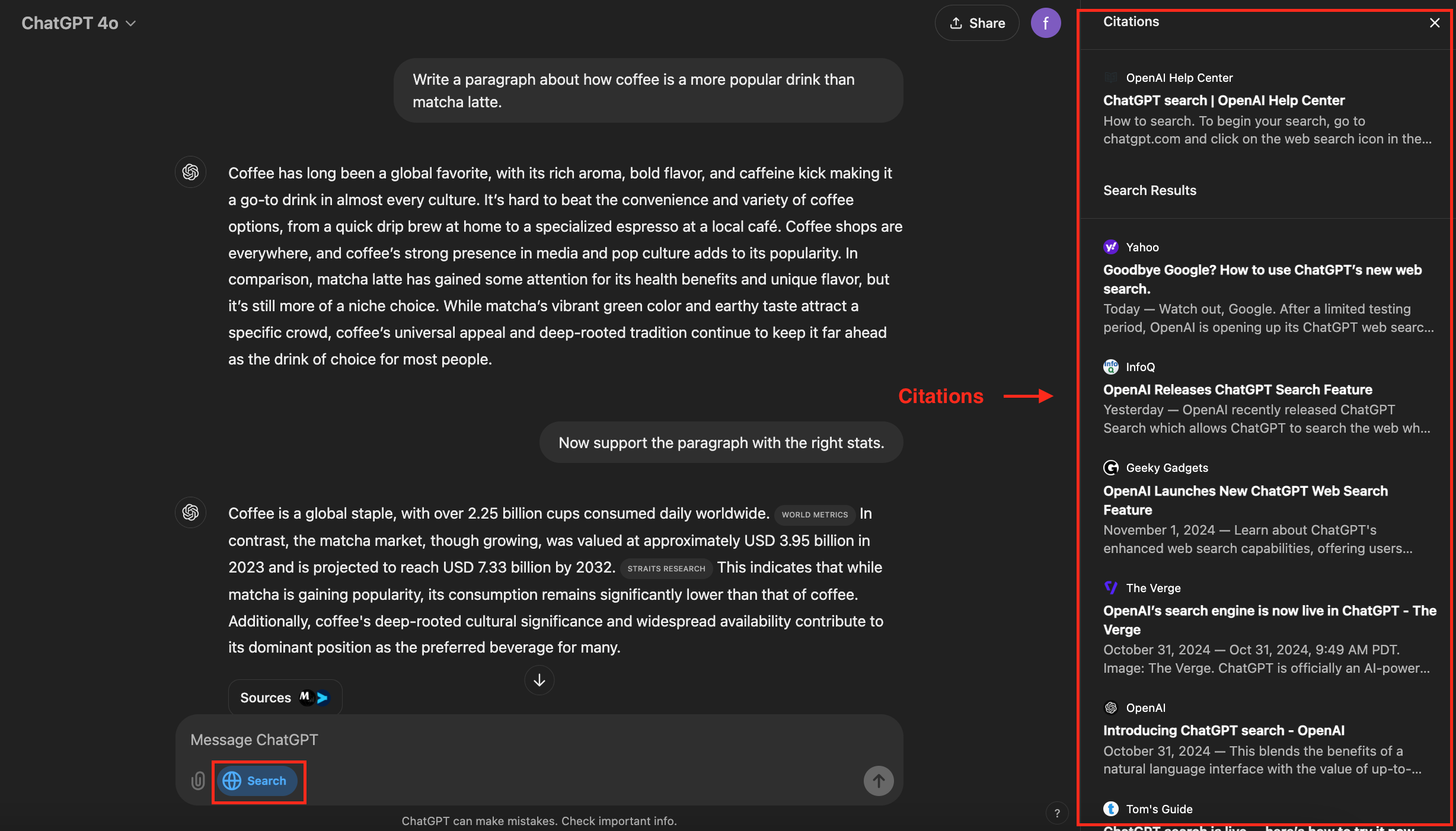
Visuals
ChatGPT’s search feature can display images directly in responses, which adds a nice visual element to certain queries. This is especially useful for information that benefits from visual aids, like maps or product comparisons.
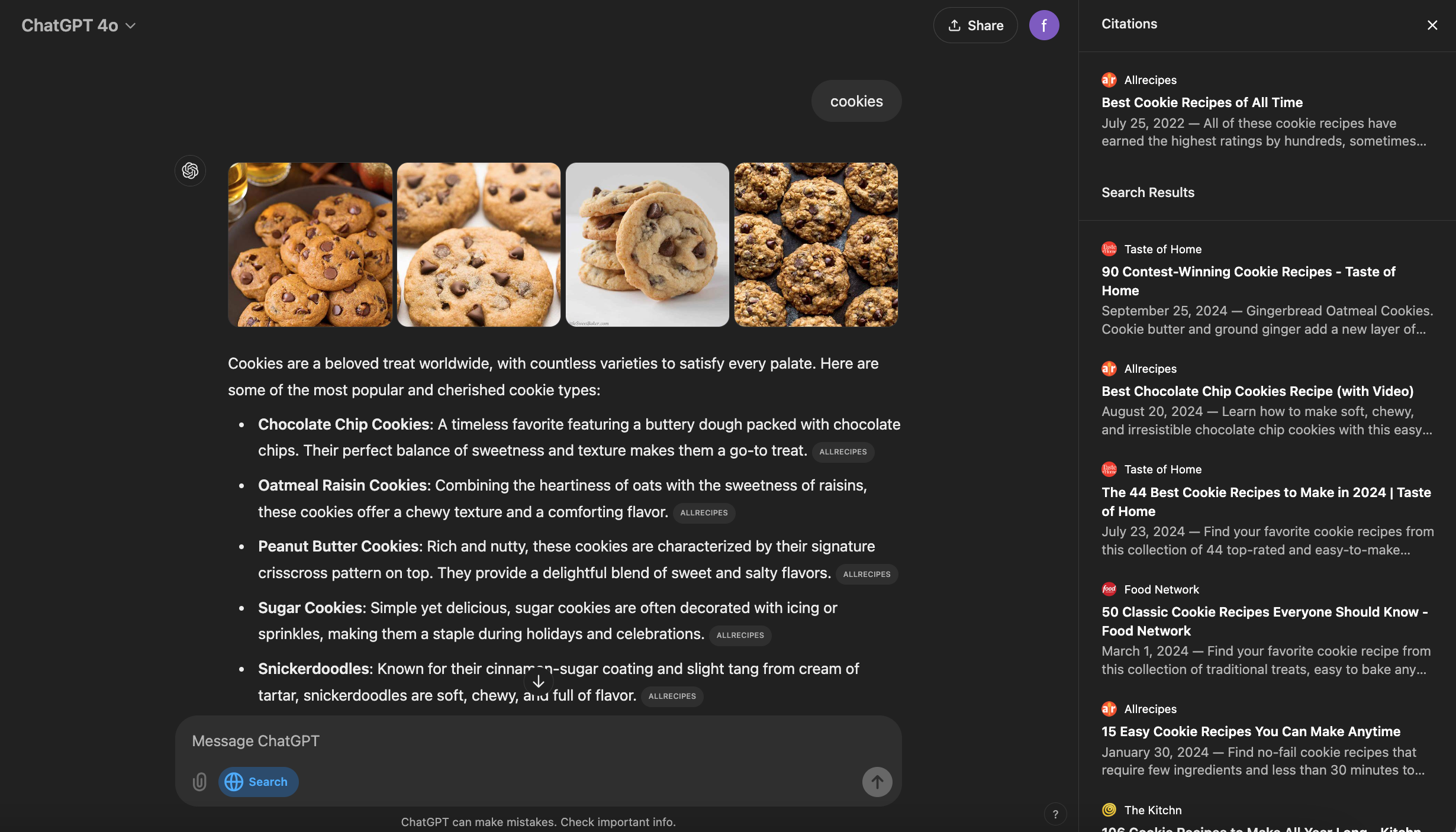
Specialty Queries
From weather updates and sports scores to nearby coffee shops or travel deals, ChatGPT Search handles a good variety of specialty queries. It can even display maps and tables for side-by-side comparisons, like comparing product features, which is super useful when you need a quick snapshot of options.
Availability and Access
Right now, ChatGPT Search is available for ChatGPT Plus and Teams users only, as well as free users who signed up for the waitlist. Broader access for free users is expected to roll out soon.
Can ChatGPT Replace Google?
So far, ChatGPT Search has been pretty decent. But reaching Google’s level? Not yet. There are some real limitations ChatGPT Search faces compared to Google.
Behavior
Most people instinctively turn to Google. Google has been the answer for search for over 20 years, and “Googling” has practically become a synonym for searching. Like how people say “Kleenex” for any tissue, “to Google” is ingrained as our go-to action when we need to find something.
As long as that habit sticks, Google isn’t going anywhere.
Trust Issues
Trust is still a major issue for AI. In fact, a global study by KPMG found that 61% of people are cautious about trusting AI systems.
And let’s be real: we’ve all seen AI hallucinate. And it’s not just ChatGPT; people don’t fully trust Google’s own AI-generated overviews (AIO) either.
On the contrary, over 50% of Americans trust Google more than what they learned in school.
Audience and Market Share
Google’s reach is huge, with a user base that’s broad and varied — it’s essentially the go-to for almost everyone. With around 89.33% of the global search engine market share, Google’s dominance reflects both its widespread use and the trust people place in it.
ChatGPT, on the other hand, is still reaching a more tech-savvy, niche audience. Despite its rapid growth (100 million users in just two months), AI-driven tools like ChatGPT Search are still a long way from Google’s mainstream, mass-market reach.
Now let’s compare some numbers.
ChatGPT vs. Google
Let’s compare the latest numbers, based on:
Monthly Visits (September 2024)
- ChatGPT: 3.1 billion
- Google: 82 billion
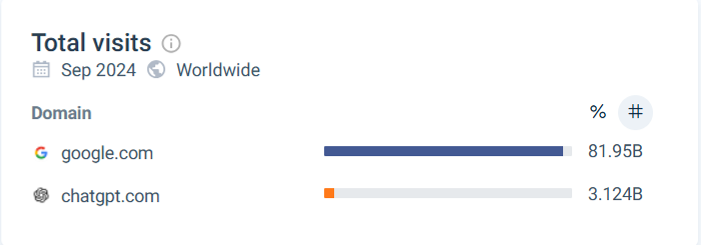
Global Website Ranking
- ChatGPT: 11th most visited
- Google: 1st most visited
Active Users
- ChatGPT: 180 million total users, with 100 million active weekly (Exploding Topics)
- Google: Not specified but with a vast global user base that dwarfs most competitors
Daily Searches/Interactions
- ChatGPT: Roughly 1.5 million interactions per day (based on daily averages)
- Google: Over 8.5 billion daily searches
Primary Function
- ChatGPT: AI-driven conversational assistant
- Google: Traditional search engine
Information Retrieval
- ChatGPT: Generates responses based on its training data and can access up-to-date information with web browsing enabled
- Google: Continuously indexes the web to provide real-time search results
User Interaction
- ChatGPT: Conversational interface, designed for interactive dialogues
- Google: Traditional list of search results, requiring users to navigate through links
Real-Time Updates and Data Sources
- Google: Continuously crawls and indexes the entire web, offering real-time data
- ChatGPT: Relies on Bing ( and others) for web crawling, so real-time coverage can be limited
Quality of Information and Accuracy
- Google: Draws on billions of pages and complex algorithms to rank results based on relevance and authority, so it excels in accuracy and variety
- ChatGPT: Uses advanced AI to generate responses based on its training data and Bing search results. Its information can sometimes be limited due to Bing’s indexing scope.
Privacy
- Google: Ad-driven model that collects extensive user data to personalize search results and ads.
- ChatGPT: Currently ad-free, with minimal data collection and no personalized ads. However, some links include UTM tracking, so future ad integration could mean more data usage.
Overall User Experience
- Google: Standard search bar and list format, but ads are prominent in results
- ChatGPT: Conversational and clean, with fewer distractions
Information Quality
- Google: Provides comprehensive results from diverse sources
- ChatGPT: Offers concise summaries that are efficient, though sometimes lacking depth
Real-Time Updates
- Google: Excellent for real-time data across most topics
- ChatGPT: Decent for many topics, but not as comprehensive as Google
Similarities Between ChatGPT And Google
ChatGPT and Google share some underlying similarities.
Both ChatGPT and Google rely heavily on artificial intelligence and its subset, machine learning.
ChatGPT utilizes deep learning, a sophisticated form of machine learning, and natural language processing (NLP) to understand and generate human-like text. This allows it to engage in conversations, answer questions, and even create creative content.
Google, on the other hand, employs machine learning algorithms across its various products, most notably in its core search algorithm. This algorithm analyzes countless signals to rank websites and deliver relevant search results.
A key aspect of this is understanding user search intent, a task where NLP also plays a crucial role, as detailed in Google’s How Search Works documentation.
SEO Implications of ChatGPT Search’s Rise
Generative AI is already reshaping SEO by focusing on delivering direct answers to user questions. While it’s still early to change your entire strategy, adapting now to this shift can position your content effectively for AI-driven search. Here’s how:
1. Focus on Evergreen Strategies
Stick to lasting SEO tactics rather than chasing one-off trends. One effective approach is NLP (Natural Language Processing) optimization which works for all search engines.
NLP optimization makes your content clearer and more relevant for search engines. It focuses on entities — important keywords or phrases that signal to search engines what your content is really about. By enhancing the salience score of these entities (how relevant each one is to the main topic), you help search engines understand and rank your content more accurately.
According to Semrush, using NLP techniques like this can boost organic traffic by up to 30%, making it an effective approach for AI-driven search. For instance, BrandWell uses an NLP Optimization tool integrated into its editor, which makes it easier to optimize for AI and search engines alike.
Learn how to use BrandWell NLP Optimization here.
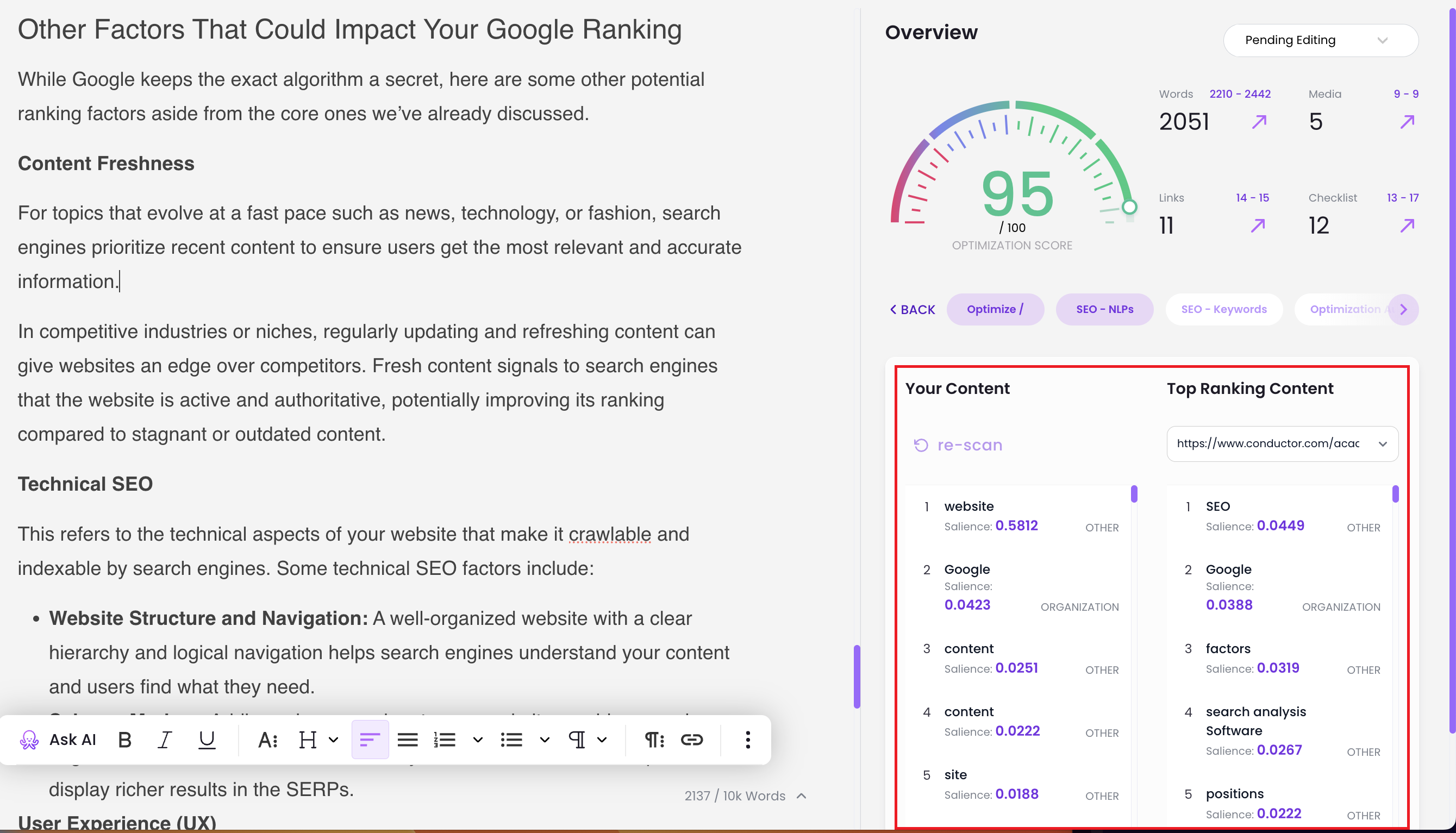
2. Answer Unique, Long-Tail Questions
With AI-driven search, people are starting to ask more specific questions — not just “best SEO practices” but “best SEO practices for a new sports website”.
By publishing content that goes deep into niche topics, you increase your chances of showing up as a cited source when users ask those complex, detailed questions.
3. Invest Where You Get the Best Traffic
Before spending time or money on new search engines, check if your target audience is actually using them. Are they searching for your content on ChatGPT? If so, it might be worth the effort. Otherwise, focus on where you’re already getting results.
Want to see how? Let me teach you my favorite method.
How to Track Traffic From ChatGPT to Your Site
To check the traffic coming from any other third-party domain, you can make a referral traffic report. This report allows you not only to see the traffic others are sending you but also which page it’s forwarding.
Step-by-step guide on how to track referral traffic from other parties to your site:
This is a free guide, and all you need is a GA4 account!
Step 1: Set up the report
- Log in to GA4.
- Go to Reports on the left sidebar.
- Find Acquisition → Traffic acquisition.
- Click the ✏️ in the top-right corner to Customize Report:

Note: If you can’t find “Acquisition”, it means the collection has not been published and you have to find and publish it from the sample reports. To do this:
- Stay in Reports and choose Library (you need editor/admin access).
- Look for Life Cycle (or any collection with Acquisition).
- Click the 3 dots → Publish.
- Now, head back to Step 1!

Step 2: Report customization
Now that we are inside the customization, we’ll do a quick 2-step customization, by Adding Filters and Setting up Dimensions from the spots shown in the image:

2.1: Go to Add Filter and set these conditions:
- Dimension: Session default channel group
- Match type: contains
- Value: type Referral
- Hit Apply.

2.2: Set the Dimension
Click Select Dimension.
- Find Session source, click the 3 dots → Set as default.
- Hit Apply, then click 💾 Save → Save as a new report.
- Give it a name! I like “Referral Traffic.”

Step 3: Track popular pages
Hover your mouse under the graph. See the table with third-party sites sending traffic to you? Want to know where this traffic goes?
- Click the blue plus icon.
- Search for Page path and screen class and select it.

Step 4: Publish the report
- We don’t want to redo this every time, right?
- Go to Reports Library.
- Find any collection (I chose Life Cycle), click the 3 dots → Edit.

Step 5: Publish
- Search for your report name (mine’s “Referral Traffic”).
- Drag and drop it under a report, like Acquisition.
- Hit Save → “Save changes to current collection.”

Your report is ready!
- Find it where we dropped it.
- Now, start tracking traffic from ChatGPT or any site you want!
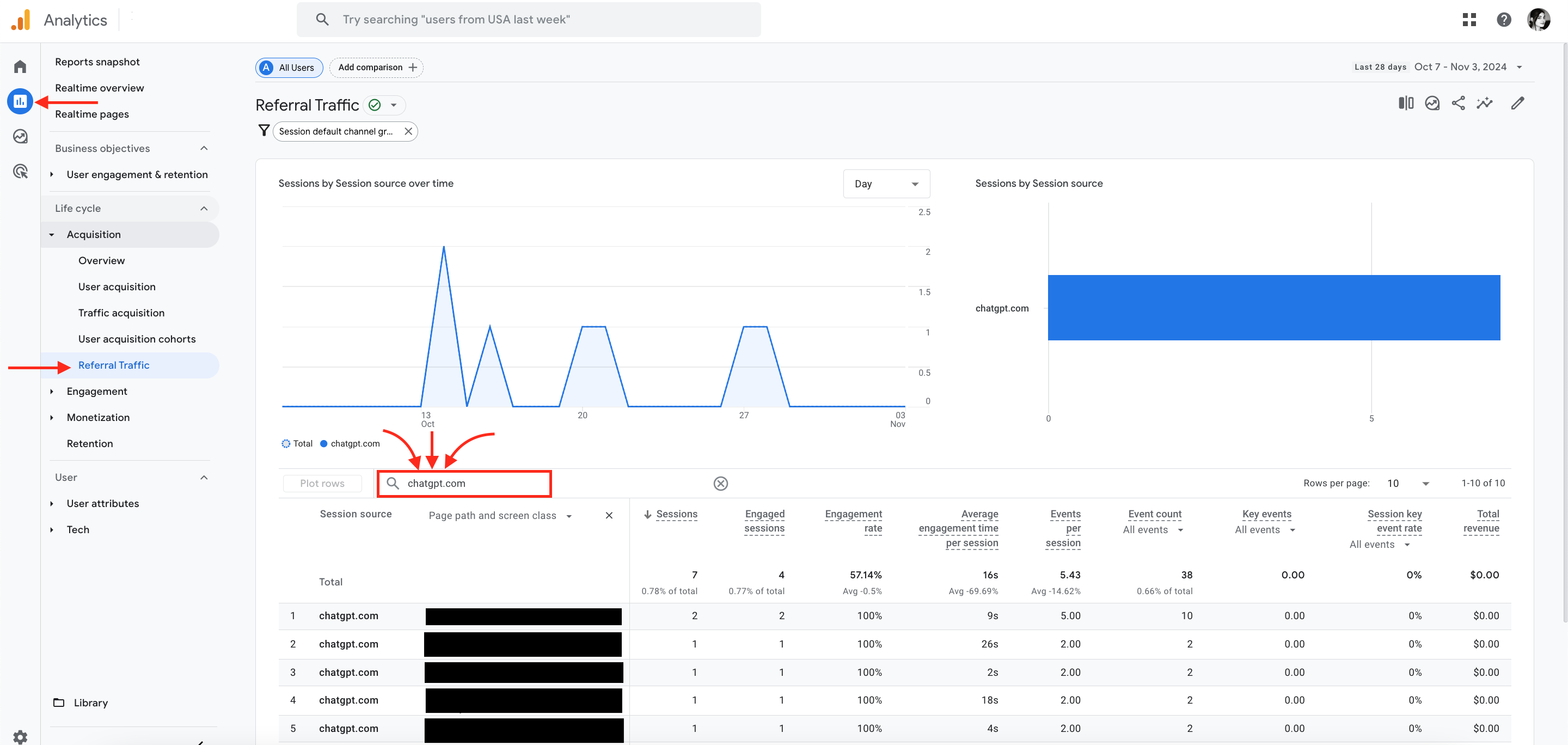
You can use this method to check your traffic from other search engines, traffic from the backlinks you’ve made, affiliates, Reddit, and more.
Final thoughts: A Potential Competitor to Google?
Although ChatGPT’s 3.1 billion monthly visits are impressive, the Google search engine still dominates with around 82 billion monthly visits.
The vast difference highlights Google’s entrenched presence and variety of tools, such as real-time travel and location services, that ChatGPT currently lacks.
For users who prioritize quick, summarized answers, ChatGPT Search is an appealing tool. But for those who prefer a more comprehensive exploration, Google’s suite of features remains irreplaceable.
However, Gartner predicts that search engine volume could drop by 25% by 2026 due to competition from AI chatbots and other virtual agents.
While ChatGPT has a long way to go to fully compete with Google’s breadth of functionality, this new search feature positions it as a strong contender in conversational search.
As the platform evolves, it may continue to integrate more tools, inching closer to becoming a comprehensive search and productivity companion.

